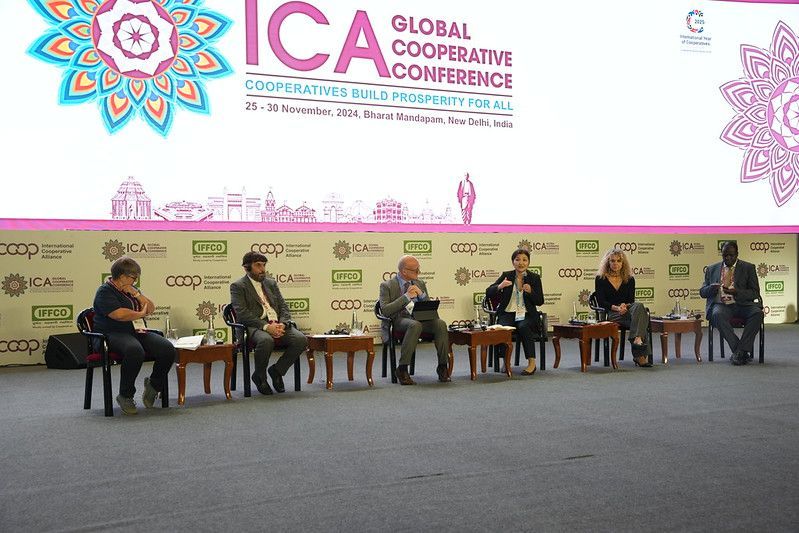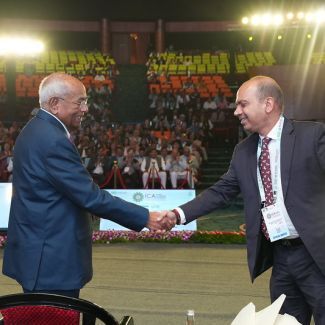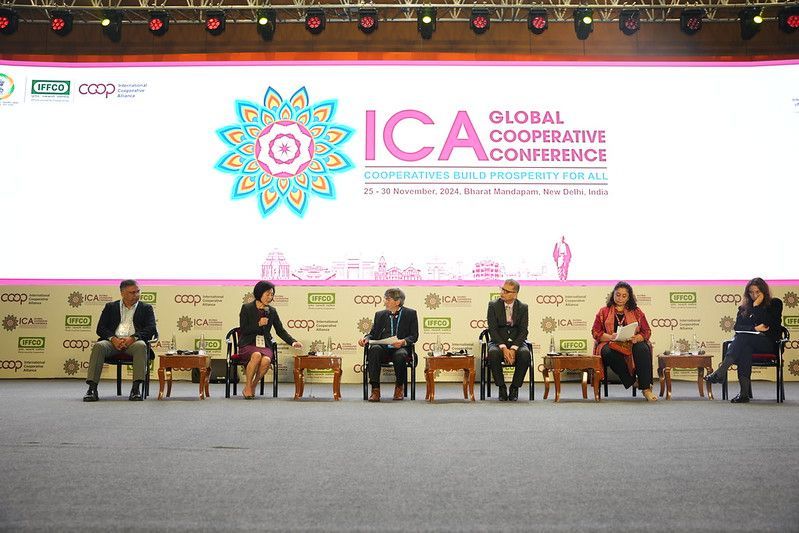
The first ICA Global Conference plenary explored the role of legislators, governments, international organisations and the public in Enabling Policy and Entrepreneurial Ecosystem for cooperatives.
Plenary I Address
Dr Ashish Kumar Bhutani, Secretary, Ministry of Cooperation Government of India, delivered an address describing initiatives by the Government of India to facilitate cooperative development, from dairy and agriculture to banking and technology – and he highlighted how the conference underscored the universal appeal of the cooperative model.
“Cooperatives are the cornerstone of India’s economic and social fabric and the conference theme Prosperity for All for all aligns with PM’s vision of Sahkar Se Samriddhi, Prosperity through Cooperation … but there is a need to unite and define the future of the coop movement,” he said.

Dr U.S. Awasthi, Managing Director, Indian Farmers Fertilizer Cooperative (IFFCO), continued with a speech describing how cooperatives are a vital part of India’s past and the establishment of the Ministry of Cooperation demonstrated the government’s commitment to take the cooperative movement “into every nook and corner of the county”.
The government, the ICA, and cooperatives more widely, share the same aim, he added: “To serve the unserved, reach the unreached, and deliver the last mile, and I’m sure together we can make a difference in today’s fractured world.”
To this end, IFFCO was “willing to help cooperatives internationalist their business anywhere in the world” - he said.
The cooperative movement has also been active in the face of global challenges, he added, noting how over the last decade cooperatives have aligned with the Sustainable Development Goals and demonstrated commitment to the environment and social welfare.
“Together we have the potential to make a difference,” he said.
The plenary featured two panels, the first on Conducive Environments for Cooperative Development, the second on Institutional Support for Cooperative Development.
Panel I.A Conducive Environments for Cooperative Development
The first panel explored how to create conducive environments for cooperatives. Moderated by Dr Nazik Beishenaly, Marie Curie Sklodowska Actions Postdoctoral Researcher, Hertie School, it heard from Mr Giuseppe Guerini, President European Confederation of Industrial and Service Cooperatives; Mr Ali Aghamohammadi, Member of The Expediency Discernment Council, Islamic Republic of Iran; Ms Amparo Merino Segovia, Spanish Social Economy Secretary of State, Spain; Mr Wycliffe Oparanya, Cabinet Secretary, Ministry of Cooperatives and MSMEs Development, Kenya; and Ms Lieve Jacobs, Cooperative Entrepreneurship Advisor, CERA Cooperative, Belgium.
Mr Guerini, who is also the President of the European Confederation of Industrial and Service Cooperatives (CECOP), talked about the importance of market policy and business market regulation, which, he said, need to be taken into account when it comes to cooperatives. He also pointed out that cooperatives can be at a disadvantage when it comes to public procurement, due to many being SMEs.
Mr Oparanya argued that Kenya has fully embraced the co-operative movement, which accounts for 40% of the country’s GDP. Kenya has had a Co-operative Ministry since 1974 and a Co-operative College, now a University, since 1967. Cooperatives play a particularly important role in banking and finance.
Ms Amparo Merino Segovia, Spanish Social Economy Secretary of State, Spain, argued her country was a reference at global level when it comes to cooperatives and the social economy. She explained that the Spanish government has a Social Economy Ministry and a whole team supporting it which shows the government’s commitment to the sector. The government has also set a social economy strategy for 2023-2027 and is exploring legislative changes to enable the sector to grow.
Mr Aghamohammadi said the cooperative sector was seen as a key actor in the government’s new vision for Iran - which starts next year and covers the next 25 years. The vision sets a target for cooperatives to contribute 25% of Iran’s GDP.
Ms Jacobs highlighted the role of education in raising awareness about cooperatives. She encouraged participants to be proud of sharing their cooperatives’ achievements, unite, collaborate, and come together to learn from each other.
Panel I.B Institutional support for Cooperative Development

The second panel was moderated by Prof Hagen Henry, Chairperson, ICA Cooperative Law Committee and centred on the role of institutional actors in promoting cooperatives.
The session featured Ms Wenyan Yang, Chairperson, UN Committee on the Promotion and Advancement of Cooperatives; Dr Ashish Shah, Director of the Division of Country Programmes, International Trade Centre; Dr Simel Esim, Manager, ILO Cooperative, Social and Solidarity Economy Unit; Ms Cécile Berranger, Rural Institutions and Services Specialist, FAO; and Mr Manish Gupta, Director of Strategy and Joint Ventures, Indian Farmers Fertilizer Cooperative.
“Cooperative policy and law have been on the agenda of institutions present here and of cooperatives themselves,” said Prof Henry, explaining that the International Labour Organisation has been working on this since the 1920s.
“Both co-op policy and law are recognised as a necessary ingredient for the development of cooperatives,” he said.
He explained that cooperative law is now no longer seen as an exclusive national affair and must translate the cooperative identity and oblige cooperatives to contribute to the Sustainable Development.
There are some of the achievements, he said, but there are challenges too, such as keeping up with the changes within enterprises such as platformisation.
Ms Yang explained that UNDESA focuses on advocating for co-ops to raise awareness in the UN system and advocate for cooperative issues within UN GAs and other entities. And works with national governments to regulate and support cooperatives.
Ms Esim explained that over 120 countries have used the ILO’s Recommendation 193 on the Promotion of Cooperatives.
She added that the implementation of the law is also important, the institutions must have the mandate, and human and financial resources to implement new laws and policies. Another aspect to take into account is whether the cooperative movement was involved in the process of developing these new policies or laws.
She also pointed out that policies and laws can be reversed when governments change so cooperatives should not be over-reliant on the state. Data is key to seeing if policies and laws work, she said. COPAC has technical working groups on economic contributions of cooperatives and produced guidelines on statistics on cooperatives.
Mr Shah Three highlighted three issues that are important for improving cooperative legislation and policies: ensuring that any new policies and legislation related to cooperatives allows them to innovate; creating a conducive environment and ecosystem for cooperatives; and intensifying advocacy efforts to raise awareness of cooperatives outside their sector.
Mr Gupta argued that cooperative law needs to be adapted to provide for different frameworks for small, middle-sized and large cooperatives. He said IFFCO would like to be able to raise capital, participate in market-driven processes, and see cooperative assets protected via legal and policy frameworks.
Photo: First Plenary panel




